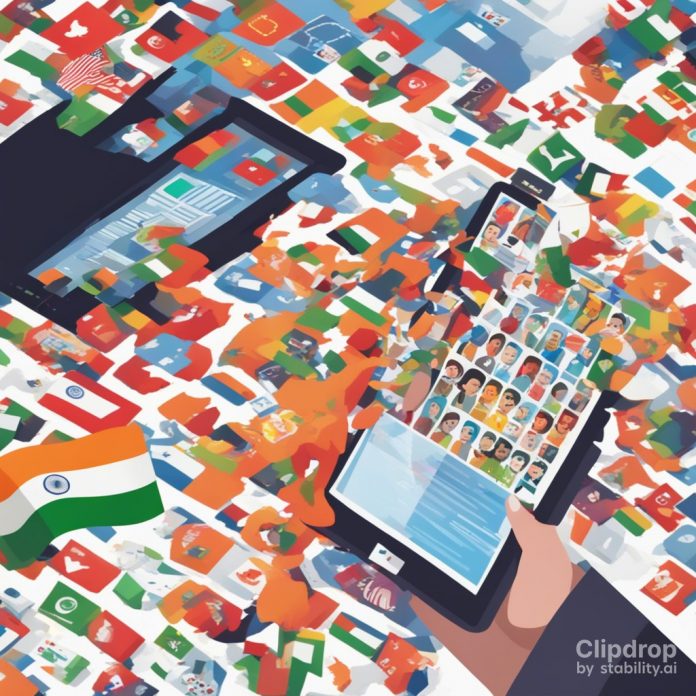Introduction
In recent years, the landscape of Indian politics has witnessed a significant transformation, largely attributed to the advent of digital platforms. As the world becomes increasingly connected through the internet and social media, political parties and candidates have recognized the immense potential of these digital avenues in shaping public opinion and winning elections. This blog explores the profound impact of digital platforms on Indian political campaigns, shedding light on the evolving strategies, challenges, and consequences of this technological shift.
The Digital Revolution in Indian Politics
India’s political arena has evolved dramatically since the turn of the 21st century. Traditional campaign methods, such as door-to-door canvassing and rallies, remain important, but they are no longer the sole focus. Instead, politicians are harnessing the power of digital platforms to reach a wider audience and engage with voters in novel ways.
- Wider Reach: One of the most apparent advantages of digital platforms is the ability to reach millions of people with a single post or advertisement. Platforms like Facebook, Twitter, Instagram, and WhatsApp have become indispensable tools for political campaigns. Candidates can now communicate directly with constituents across the country, transcending geographical boundaries.
- Targeted Advertising: Digital platforms allow political campaigns to tailor their messages to specific demographics and regions. Advanced data analytics enable parties to identify swing voters and craft personalized content that resonates with them. This level of precision was unthinkable in the era of traditional media.
- Real-time Feedback: Social media provides politicians with immediate feedback from their constituents. This instant communication helps candidates gauge public sentiment, address concerns, and adapt their campaign strategies in real-time.
- Fundraising: Online platforms have also transformed the fundraising landscape. Crowdsourcing and online donation campaigns have become popular methods for political fundraising, reducing reliance on corporate donations and promoting transparency.
Challenges and Concerns
While digital platforms offer unprecedented opportunities, they also present a set of challenges and concerns:
- Misinformation and Fake News: The rapid dissemination of information on social media can lead to the spread of misinformation and fake news. Political rivals often use this to their advantage, sowing confusion and mistrust among voters.
- Privacy Concerns: Collecting and utilizing vast amounts of personal data for political campaigning raises privacy concerns. The misuse of data has led to concerns about the ethical and legal implications of digital campaigning.
- Polarization: Digital platforms can contribute to political polarization by creating echo chambers where individuals are exposed only to opinions that align with their own. This can exacerbate division and hinder constructive political discourse.
- Regulation and Accountability: Policymakers and tech companies are grappling with the need for appropriate regulation to ensure fair and transparent digital campaigning. Balancing free speech with the prevention of abuse remains a complex challenge.
The Future of Digital Campaigning in India
The impact of digital platforms on Indian political campaigns is likely to continue evolving. Here are some potential future trends:
- Greater Regulation: As the importance of digital campaigning grows, we can expect more comprehensive regulation to address concerns related to privacy, misinformation, and campaign financing.
- AI and Data Analytics: The use of artificial intelligence and advanced data analytics will become even more prominent, allowing political campaigns to fine-tune their strategies and messages.
- Virtual Campaigning: Virtual reality and augmented reality technologies may play a significant role in future campaigns, allowing candidates to engage with voters in immersive and innovative ways.
- Increased Digital Literacy: With the prevalence of digital campaigns, there will be a growing emphasis on digital literacy among voters to help them critically evaluate information and make informed decisions.
Conclusion
Digital platforms have undoubtedly revolutionized Indian political campaigns. While they offer numerous advantages, they also bring about challenges that must be addressed. As technology continues to shape the political landscape, it is crucial for policymakers, tech companies, and citizens to work together to ensure that the impact of digital campaigning remains positive, transparent, and fair. Ultimately, understanding this impact is vital for the future of Indian democracy and the way its political leaders connect with their constituents.

